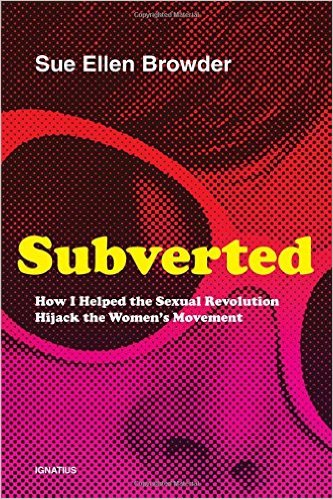A Freelancer's Tale
Subverted is an engagingly written memoir by a successful freelance journalist who spent two rookie years working as an underpaid staff writer for Cosmopolitan magazine in New York during the early 1970s and contributed articles off and on to Cosmo until the mid-1990s, when, having discovered that editor Helen Gurley Brown was still systematically underpaying her, she got into a compensation snit with Brown’s myrmidons, and effectively ended her relationship with the sex tell-all women’s magazine.
What Subverted is not, however, is a demonstration of (in the words of its subtitle) How I Helped the Sexual Revolution Hijack the Women’s Movement. There’s no lid-blowing revelation of Sue Ellen Browder’s personal participation in manipulating the nascent feminist movement of the late 1960s and early 1970s into a tributary of the simultaneously nascent sexual revolution.
The reader is primed for an exposé by declarations like, “I should know because I was one of the propagandists who helped sell single women on the notion that sex outside of marriage would set them free.” Possibly so, but Browder, during her brief years on the Cosmo staff (during which she seems never to have met Brown personally) actually wrote very few articles like “When He Doesn’t Want Sex” and “What to Do About Those Ubiquitous Vaginal Infections.” Those two were hers; but even Cosmo girls, it seems, don’t think about doing the deed all the time, for the bulk of Browder’s assignments for the magazine covered such anodyne subjects as urban bicycling and how to handle a job interview.
Most of that time Browder was sending her work, which chiefly dealt with medical and parenting topics (she was already a mother when she went to work for Cosmo), to such publications as New Woman (where she was a contributing editor), Reader’s Digest, Woman’s Day, and various newspapers. During the 1980s and 1990s she wrote or co-wrote several bestselling books: The American Biking Atlas and Touring Guide, The New Age Baby Name Book (just out of print after a run of more than 30 years), Born Dancing, a parental guide to intuiting one’s baby’s natural rhythms, and Ordinary Women, Extraordinary Sex.
The last-mentioned book from 1994, written in collaboration with sex therapist Sandra Scantling (still going strong to this day dishing out orgasm advice), was the closest Browder ever came during her post-Cosmo-staff years to propagating the Cosmo ethos. It netted Browder an impressive six-figure book advance, although she pulled out of the project after the Sinclair Institute, a one-stop erotica shop that is also still going strong, approached her about turning the book into a “soft-porn ‘educational’ videotape series.”
Browder makes her narrative sound more wicked than it actually seems to have been because the story she actually wants to tell is that of her Christian conversion and the conversion of her husband of 40 years. Her model, she says, is the famous Confessions written circa AD 400 by the sinner-turned-bishop, Augustine of Hippo. St. Augustine’s book helped lead the nominally Protestant Sue Ellen and Walter Browder first into active membership in the Episcopal Church and later to Catholicism. (Ignatius Press, Subverted’s publisher, is a Catholic publishing firm.) During a low period when the couple were in dire financial straits, Browder aborted their third child. The procedure caused her grief and misery even while it was taking place, and it is not surprising that she later connected it to the supposedly consequence-free sex that she saw promoted at Cosmo.
Betty Friedan’s The Feminine Mystique was published in 1963, when Browder was 17, and Browder, whose own mother’s life seemed to have been stifled by small-town housewifery, was inspired by Friedan’s call for married women to have careers of their own. Browder herself had been summarily fired from her first newspaper job for getting pregnant. One of the themes of Subverted is that the abortion-rights activist Lawrence Lader, founder of the organization now known as NARAL Pro-Choice America, took advantage of his longtime friendship with Friedan to persuade her to make abortion an ideological pillar of the National Organization for Women that she had cofounded, subverting the original Friedan quest simply for better job opportunities for women.
Browder devotes about a third of her book to what she describes as the machinations of Lader and Friedan to radicalize the nascent feminist movement, and also to the dubious legal underpinnings of Roe v. Wade, the Supreme Court’s much-criticized (even by liberal scholars) 1973 decision finding a constitutional right to abortion. Those parts of the book appear to be thoroughly researched and annotated, but they’re third-hand, and they’re the least interesting part of it.
Where Subverted is genuinely gripping—so much so that I devoured the whole book in a single afternoon—is in the first-person story it tells of the life of a freelance writer, with its professional and financial ups and downs. Especially when you are, as Browder was, married to another freelance writer, and the downs tend to follow the ups instead of vice versa. I’ve been a freelancer myself for many years, and I know whereof Browder speaks. Freelance writing is the ultimate gig-economy line of work, and if you choose it, you want to wed a spouse with a regular salary and benefits. Browder didn’t. She and Walter Browder met and married as students at the University of Missouri during the 1960s, she majoring in journalism and he, an aspiring novelist, in English. The two followed their dreams, crisscrossing the country several times over the years as they pursued opportunities to lead writerly lives.
As we have seen, Sue Ellen Browder managed to earn a good living, although the checks didn’t arrive regularly. But Walter Browder, impulsive and uncompromising, had trouble selling his novels and screenplays, and the works that did find publishers languished in the bookstores. Checks bounced, the electricity got turned off, the car broke down and there was no money to pay a mechanic. The Browders never scraped together enough to buy a home, and the family had no health insurance until Walter, desperate to bring in some regular earnings, took a temp job he loathed as a glorified secretary that eventually became permanent with medical benefits.
There were screaming fights between the two. There were bouts of depression for Sue Ellen, and there were thoughts of divorce. Nonetheless, the pair managed to sustain each other through love and loyalty, and also their deepening religious faith. They were devoted to their two children, whom they sent to excellent colleges (their daughter’s tuition at Johns Hopkins courtesy of Ordinary Women, Extraordinary Sex). During the early 2000s they coauthored a pair of successful gift books, 101 Secrets a Good Dad Knows and 101 Secrets a Cool Mom Knows (how to carve a whistle, how to crack an egg with one hand), based on the couple’s handy-around-the-house resourcefulness that had kept their household stapled together during some economically precarious years.
In 2007, Walter was diagnosed with lymphoma, and he died shortly after midnight on New Year’s Day 2008 in the intensive care unit of a hospital in San Francisco. The cancer had spread to his brain, and Sue Ellen kept him company to the end, singing Christmas carols to him as he sank into irretrievable unconsciousness. During his last days, Sue Ellen put on his wedding ring “covered with little dings, nicks, and scratches from a lifetime of hard work.” I cried when I read this. Subverted may not really be about the sexual revolution or Betty Friedan or Helen Gurley Brown, but it’s the story of two people who faced their difficult lives with courage and hope. It was well worth it.


